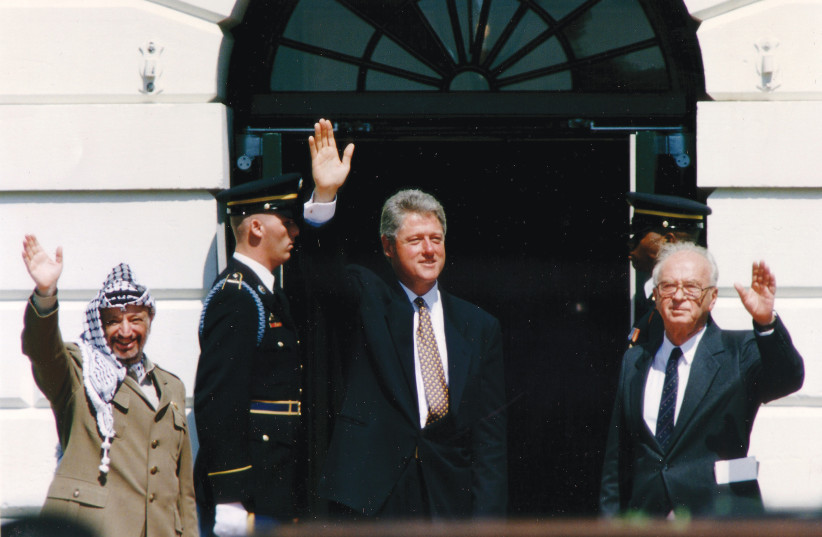One of the most insidious lies perpetuated against Israel by anti-Israel activists and critics is that Israel is practicing apartheid in the West Bank. For instance, author David Grossman grossly distorted reality when he reiterated the lie that Israel is guilty of practicing apartheid in the West Bank. In actuality, the policies that Israel has enacted in the West Bank are not apartheid.
Under international law, apartheid is listed as a crime against humanity under Article 7 of the Rome Statute, as defined in paragraph 2(h) of the Article as the systematic oppression and domination by one racial group over any other racial group or groups and committed with the intention of maintaining that regime.
The term apartheid comes from the Afrikaans word meaning apartness, which described the institutionalized racist policies implemented in South Africa from 1948-1994, when the country’s white minority legislated its domination over the non-white majority in every facet of society. Israel has implemented no such system in the West Bank.
A common accusation leveled against Israel is that the application of two different legal systems, with military law being applied to Palestinians in the West Bank and Israeli civilian law applied to Israelis, is evidence of apartheid. However, it is important to note that West Bank Palestinians are not Israeli citizens and should not be governed by Israeli law. During the 1990s, Israel and the Palestinian representatives entered into bilateral agreements, with the 1993 Declaration of Principles and the 1995 Interim Agreement, which came to be known together as the Oslo Accords.
Under the Oslo Accords, both sides agreed to divide the West Bank into three distinct areas: Areas A, B, and C. Areas A and B are both under the civil administration of the Palestinian leadership. These two areas are where 98% of the Palestinian population living in the West Bank is located. Consequently, the Palestinian leadership governs nearly all Palestinians in the West Bank and is responsible for all administrative obligations over them, such as policing, taxes, education, municipal governments, court systems and other services in these two designated areas. Area C is administered by Israel. While Israel’s control of the West Bank does not meet the traditional international definition of occupation, Israel has decided to abide by the humanitarian provisions of the Fourth Geneva Convention.

As such, following Article 66 of the Fourth Geneva Convention, Israel established military courts in Area C. Israel would be forbidden from applying its own civil legal system over West Bank Palestinians, following Article 43 of the Hague Conventions. Consequently, following international law, Israel is obliged to process Palestinians that commit crimes in the West Bank in military courts instead of Israeli civilian courts, because they are not citizens of Israel.
Critics of Israel have also asserted that Israel’s security barrier constitutes an apartheid wall that is meant to segregate Palestinians and benefit Jewish Israelis. Likewise, these critics claim that measures such as security checkpoints and crossings, along with bypass roads, limit Palestinian movement and are instances of apartheid.
However, these security measures were not put in place to maintain a regime where one racial or ethnic group dominates over another racial or ethnic group, instead, the purpose of these security measures are to protect the lives of Israel’s citizens. In 2000, the Palestinian leadership launched the Second Intifada, which resulted in brutal terrorist attacks that killed approximately 1,000 Israelis and injured 7,000 more. In 2002 alone, there were over 450 Israelis killed in terror attacks.
Prior to the construction of the fence in 2002, there were no natural or artificial barriers that could stymie the efforts of militants from crossing into Israeli-controlled territory. The security barrier has proven to be an extremely effective method in preventing terrorist attacks, as the number of those killed as a result of terrorism emanating out of the West Bank decreased by over 90%. In fact, Ramadan Shalah, the former head of the Palestinian Islamic Jihad terrorist group stated that the security barrier hurts the organization’s ability to carry out attacks and that if it wasn’t there, the situation would be entirely different. The security barrier is not permanent and Israel allows for Palestinians to file legal suits to change the route of the barrier, and some have done so successfully on several occasions. For instance, Israel has moved the barrier away from the villages of Bil’in, Azzun, Nebi Alias, and others.
At that time, Israel increased the number of checkpoints in an effort to stop terrorism, which played an important role in preventing terrorism. These checkpoints continue to remain indispensable to Israel’s security. For instance, in 2012, Israel prevented 435 attempts to smuggle weapons through the checkpoints. Security crossings exist on the boundaries of the Israeli controlled areas and the Palestinian controlled areas. These are akin to security checks at airports and foreign border crossings. Security checkpoints and crossings to prevent terrorism aren’t incompatible with Palestinian freedom of movement. For instance, in 2013 there were nearly 11 million entries at all crossings. Additionally, there are roads in the West Bank that connect Palestinian cities, where Palestinians don’t have to encounter a single checkpoint.
These reasons show why the apartheid charge is patently false and is only used to delegitimize Israel. That is why former South African Constitutional Court Justice Richard Goldstone, who Nelson Mandela asked to assist with their transition out of apartheid, said, “those who conflate the situations in Israel and the West Bank and liken both to the old South Africa do a disservice to all who hope for justice and peace.”
The writer is a lawyer at Rudolph Clarke and a graduate of the Widener University School of Law.
